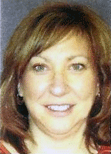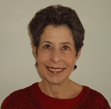hear From Others
Personal Stories

Finding out you have breast cancer is a frightening experience. Even though I had a medical background, I knew very little about breast cancer and had to learn very quickly about my own diagnosis. For many patients, their only source of information may be from their physician. Living in a small town far away from a teaching hospital made me realize that my breast surgeon’s office was like going back in time 20 years. My suspicions about him being really out of date were quickly confirmed. I didn't know exactly where to turn and how to process the mountain of information I found on the Internet.
In my case, I googled my diagnosis—ductal carcinoma in situ (DCIS) and then found an article by Dr. Brian Czerniecki that discussed which DCIS might be more likely to develop into invasive breast cancer. He also mentioned that he was developing a vaccine in a clinical trial. The article had just been published, and it included his email address. I emailed him and he responded in six minutes. After sending all my pathology slides and meeting with him in Philadelphia, I entered the trial and had a vaccine made out of my own cells to help my body become immune to DCIS/Her2/neu cells.
I was extremely fortunate. I did have to travel to Philadelphia from Florida 10 times, but it was so worth it, and I tolerated the process very well with no side effects. In clinical trials, you have the opportunity to get a treatment that may be available to the general public sometime in the future.
I help raise funds for cancer vaccine clinical research through a nonprofit organization called Pennies in Action. I attend many courses and educational symposiums, and am very involved helping other women with breast cancer. That is why I find a resource like BCT so useful. I have referred many women to the site. It is very hard to navigate some the .gov sites that provide information about clinical trials. Most women are not research scientists, and it’s far from easy to interpret the language and terminology used to name the trials.
BCT helps overcome this barrier and makes it easy and non-confusing at a time when newly diagnosed patients really need clear information. BCT provides a comprehensive source of information that can save you hours of searching and you can use it reassured that they are covering the bases for you. It is nice to know that BCT is here for patients, way ahead of the curve, and that they're when you need it most.
I was diagnosed in November 2005 with stage IV invasive breast cancer that had spread to my bones and liver. I’ve been on TDM1 since March of 2008 and it is the first drug that’s made me NED (no evidence of disease). It is given as an infusion every 4 weeks in my port. Because I am on this drug and in this trial, I have to get a PET scan and echocardiogram every 4 months.
It was initially difficult for me to get into the trial because there wasn’t a lot of tissue on my slide when they did my mastectomy. Fortunately, or should I say unfortunately, I had tumors in my liver, so I had a liver biopsy to get a sample of my breast cancer. The biopsy showed that I qualified for the study drug.
TDM1 is officially called trastuzumab emtansine. TDM1 uses the targeted therapy trastuzumab (Herceptin), which homes in on and attaches to HER2-positive cancer cells, to deliver a cancer-killing drug called DM1. This means the cells receive a double-whammy: Herceptin and DM1. Because it is a targeted drug, TDM1 goes right to the tumor, and it does not affect the good cells in your body, like the (red devil) Adriamycin or Taxol, which many of us get when we are first diagnosed.
Like most treatments, though, it does have its side effects. For me, these have been neuropathy in my hands and feet, fatigue, and chemo brain. I’m not sure if the chemo brain is the result of being on some sort of treatment since my diagnosis in November 2005, or if it’s the TDM1 that’s causing it.
My oncologist has lowered my dose twice to relieve the pain, but according to the study protocol we can no longer lower the dose (their drug, their rules). I have been told that based on the results the researchers are seeing in the study I’m on, the FDA is expected to approve TDM1 soon. When that happens, I may take a break from the drug. Until then, I will stay in the study. If I were drop out I could not get back in, because the study is now closed.
I can honestly say that this drug has given me quality of life, and for that I am very thankful and praise God everyday for His gracious gift and for putting me in the path of the best oncologist. Without the compassion and dedication my oncologist has, and without TDM1, I don’t believe I would still be here today.
If you have a chance to get into a study, I would recommend doing it. I’ve been on this cancer journey for almost six years now, and over half of them have been NED thanks to TDM1.
More women and men are living with breast cancer today than ever before! I believe this is a direct result of participation in clinical trials. Without the involvement of others who contributed to research, I know my breast cancer journey would not be as successful.
At 49, I was diagnosed with stage III invasive breast cancer. Being proactive was reassuring, and finding a clinical trial that best suited my goals for treatment was at my fingertips. BreastCancerTrials.org provided me with many options for my cancer management. Traveling from Pennsylvania to North Carolina for a trial was a minor inconvenience. Benefiting from the data of the trial and completing my treatment team with the doctor heading the trial was a huge unexpected blessing!
I recently attended a seminar at my local community hospital on the subject of new cancer
treatments. Afterward, they asked the audience “What other subjects would interest you?” I didn't hesitate with my response: “Clinical trials and why should I participate.”
The greatest wish I could bequest to all breast cancer patients is the gift of empowerment! BreastCancerTrials.org gives you the knowledge, choices, and resources that can help you to achieve the best possible outcome, therefore, helping even more people live with breast cancer.

BreastCancerTrials.org really opened my eyes to the many clinical trials out there.
After being diagnosed with breast cancer, I knew that I needed to learn more about clinical trials, but I didn't know where to even start. It was easy to get “lost in the weeds,” because there were so many Internet sites with so much information about clinical trials.
Once I found BCT, I stopped worrying that I would miss out on a trial that could possibly help me. BCT is so comprehensive, well organized, and easy to use! By using BCT, I feel that nothing will fall through the cracks! I’m confident that BCT will alert me to any trial out there that could benefit me.


